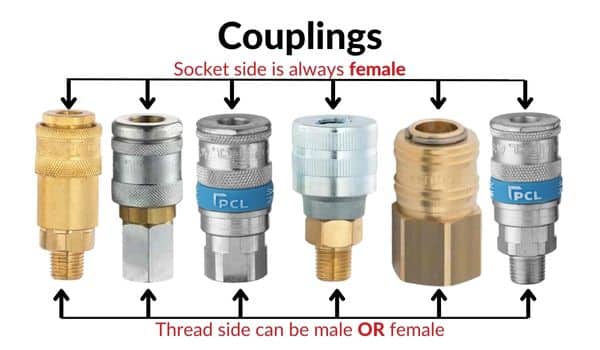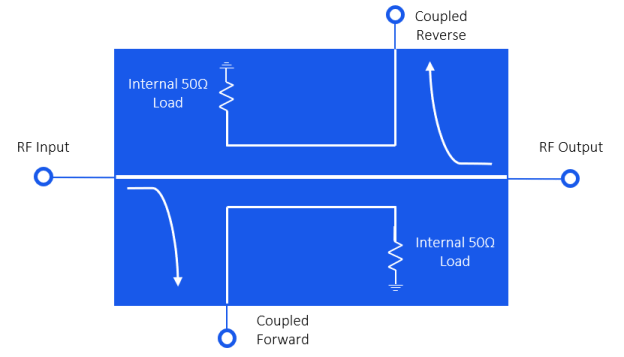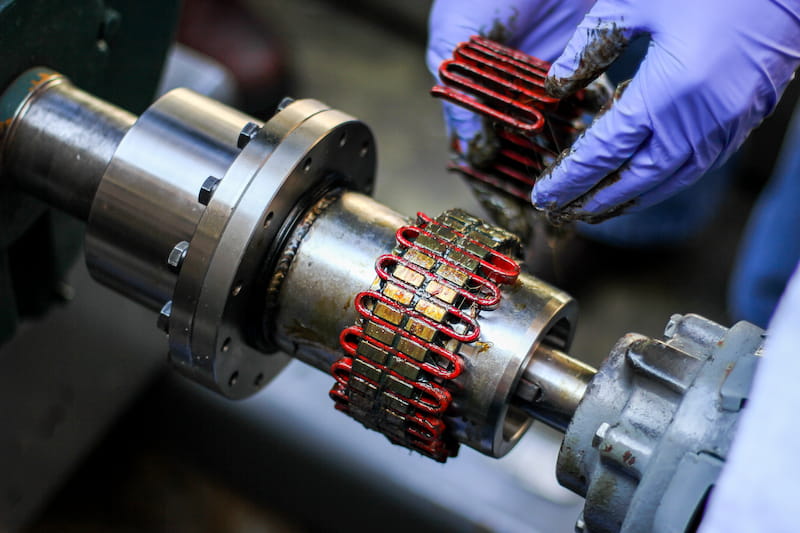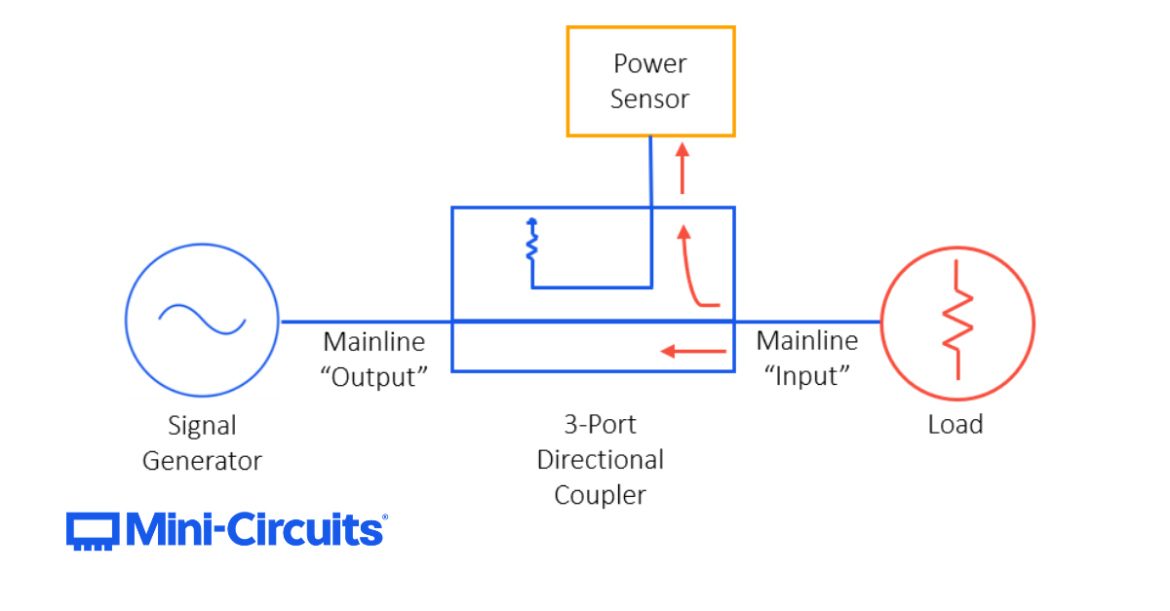If you’ve ever wondered about the importance of couplers and how to select the appropriate ones, look no further. Couplers may seem like small components, but they play a significant role in various industries. From construction to manufacturing, couplers are vital for connecting and securing different materials and structures. Whether you need to join metal pipes, electrical cables, or hydraulic systems, choosing the right couplers can ensure reliable and efficient connections. In this article, we will explore the significance of couplers and provide you with valuable insights on selecting the right ones for your specific needs. So, let’s dive in and discover the world of couplers!

Understanding the Significance of Couplers
Overview of Couplers
Couplers are mechanical devices that connect two or more components together, allowing for the transfer of fluids, gases, or electricity. They play a vital role in various industries, enabling efficient and secure connections between equipment and systems. Couplers are commonly used in applications such as construction, automotive, agriculture, and fluid handling.
Why Couplers Are Important in Various Industries
The importance of couplers in various industries cannot be overstated. In construction, couplers are used to connect hydraulic hoses, allowing for the seamless operation of heavy machinery. In the automotive industry, couplers are necessary for fuel and coolant systems, ensuring optimal performance and safety. In agriculture, couplers are utilized for irrigation systems and fluid transfer in machinery. Couplers also play a significant role in fluid handling, enabling efficient and leak-free connections in pipelines and hoses.
Benefits of Using Couplers
Using couplers offers several benefits. First and foremost, they provide a secure and reliable connection between equipment, reducing the risk of leakage, spills, and accidents. Couplers also streamline the setup and breakdown processes, saving time and improving overall efficiency. Additionally, employing couplers allows for the easy interchangeability of components, making maintenance and repairs hassle-free. Furthermore, couplers enhance worker safety by providing a means to quickly disconnect and isolate systems under pressure.
Types of Couplers
There are various types of couplers available, each tailored to specific applications and requirements. The key types include quick couplers, compression couplers, cam and groove couplers, hydraulic couplers, and pneumatic couplers. The selection of the appropriate coupler depends on factors such as the type of fluid or material being transferred, operating pressure, temperature, and compatibility with equipment.
Factors to Consider When Choosing Couplers
Application Requirements
Before choosing a coupler, it is crucial to assess the specific requirements of your application. Consider factors such as the type of fluid or medium being transferred, the operating pressure and temperature, and any specific regulations or standards that need to be met. Understanding these requirements will help you select a coupler that can handle the demands of your application effectively.
Compatibility with Equipment
Another significant factor to consider is the compatibility of the coupler with your equipment. Ensure that the coupler is designed to fit your existing connections or systems, taking into account factors such as thread type and size. It is important to verify that the coupler is compatible with any standardized coupling systems used in your industry for easy interchangeability and compatibility with different brands and models of equipment.
Load Capacity
Evaluate the load capacity of the coupler, ensuring it can handle the maximum pressure and flow rate required by your application. Consider the potential for vibration and shock resistance, as well as the need for seal integrity. It is essential to choose a coupler that can withstand the demands of your equipment and maintain a secure and reliable connection under various operating conditions.
Environmental Conditions
The environment in which the coupler will be used is another critical aspect to consider. Assess factors such as corrosion resistance, chemical compatibility, and resistance to temperature and weather extremes. If the coupler will be exposed to dust, dirt, or water, ensure that it is designed to withstand these conditions without compromising its performance or integrity.
Budget Constraints
While it is important to consider your budget when selecting a coupler, it is equally crucial to balance cost with quality. Set a realistic budget and consider the long-term maintenance costs associated with different types of couplers. Compare brands and suppliers to find the best value for your investment, ensuring that the chosen coupler meets all the necessary requirements without compromising safety or performance.
Different Types of Couplers and Their Uses
Quick Couplers
Quick couplers, also known as quick disconnect couplers, are widely used in applications that require frequent connections and disconnections. They enable fast and easy attachment and detachment of hoses or pipes, saving time and effort. Quick couplers are commonly found in hydraulic and pneumatic systems, as well as in industries such as construction, manufacturing, and automotive.
Compression Couplers
Compression couplers, also referred to as compression fittings, are used for joining pipes or tubes together. They utilize a compression nut and ferrule to create a tight seal, providing a leak-free connection. Compression couplers are often used in plumbing, gas supply systems, and some industrial applications.
Cam and Groove Couplers
Cam and groove couplers are designed for quick and easy connections between hoses, pipes, or tanks. They use a cam arm and groove system for secure attachment and can be used for both fluid and dry bulk applications. Cam and groove couplers are commonly used in industries such as agriculture, petroleum, chemical, and food processing.
Hydraulic Couplers
Hydraulic couplers are specifically designed for hydraulic systems and are used to connect hydraulic hoses and components. They ensure a tight seal under high pressure, allowing for the efficient transfer of power. Hydraulic couplers are widely used in construction, agriculture, mining, and other applications that require heavy machinery powered by hydraulic systems.
Pneumatic Couplers
Pneumatic couplers, also known as air couplers, are used to connect pneumatic tools and equipment to an air supply. They provide a secure and leak-resistant connection, allowing for efficient and reliable operation of pneumatic systems. Pneumatic couplers are commonly used in industries such as manufacturing, automotive, and construction.
Understanding Coupler Specifications
Thread Type and Size
When choosing a coupler, it is crucial to consider the thread type and size to ensure compatibility with your equipment. Common thread types include NPT (National Pipe Thread), BSP (British Standard Pipe), and metric threads. It is essential to select a coupler that matches the thread type and size of your equipment for a secure and leak-free connection.
Pressure Ratings
Couplers have specific pressure ratings that indicate the maximum pressure they can withstand. It is important to choose a coupler with a pressure rating that exceeds the maximum pressure of your application to ensure safe and reliable operation. Failure to do so may result in leaks, damage to equipment, or even personal injury.
Material and Durability
The material from which the coupler is made has a significant impact on its durability and performance. Common materials include brass, stainless steel, aluminum, and various types of plastics. Consider factors such as corrosion resistance, chemical compatibility, and strength when selecting a coupler material. Choose a material that can withstand the environmental conditions and demands of your application for long-lasting and reliable performance.
Flow Rate and Leakage
The flow rate of a coupler refers to the volume of fluid or gas that can pass through it in a given time. It is essential to choose a coupler with a flow rate that meets the requirements of your application to ensure optimal performance. Additionally, consider the coupler’s ability to prevent leakage, as even small leaks can result in product loss, contamination, or safety hazards.

Assessing Application Requirements
Identifying the Purpose of Couplers
Understanding the specific purpose of couplers in your application is crucial for choosing the right ones. Determine whether the couplers will be used for fluid transfer, powering machinery, connecting systems, or any other specific function. This will help narrow down the type of coupler that best suits your needs.
Determine Fluid Compatibility
Before selecting a coupler, it is important to determine the compatibility of the coupler material with the fluids or gases being transferred. Some fluids may be corrosive or reactive with certain materials, which can compromise the integrity of the coupler and pose safety risks. Ensure that the coupler material is compatible with the fluids or gases used in your application.
Consider Flow Rate and Pressure
Evaluate the required flow rate and pressure of your application to ensure that the chosen coupler can handle the demands. High-flow applications may require couplers with larger internal diameters, while high-pressure applications may require couplers with higher pressure ratings. Understanding these requirements will help you select couplers that can provide efficient and reliable performance.
Temperature Limitations
Consider the temperature limitations of the coupler and ensure that it can withstand the highest and lowest temperatures present in your application. Extreme temperatures can affect the material properties of couplers, leading to leaks or failures. Choose couplers that are specifically rated for the temperatures encountered in your application to ensure long-term reliability.
Evaluating Compatibility with Equipment
Identify Equipment Connections
Before selecting a coupler, identify the connections required by your equipment. Consider the type of connection, such as threaded, flanged, or push-to-connect. Take accurate measurements to determine the size and thread type required for the coupler to fit properly. It is essential to select a coupler that can be easily integrated into your equipment’s existing connections.
Check for Standardized Coupling Systems
Many industries utilize standardized coupling systems to ensure compatibility between different equipment and components. It is important to check if your equipment follows any specific standards or coupling systems. Choosing couplers that conform to these standards will enable easy interchangeability and compatibility with other equipment and components.
Consider Space and Accessibility
Evaluate the available space for coupler installation and consider any restrictions or limitations that may affect accessibility. Some applications may have limited space, making it necessary to choose compact coupler designs. Additionally, consider factors such as ease of installation, maintenance, and operation when selecting a coupler that fits your equipment’s space and accessibility requirements.
Evaluate Safety Features
Safety should always be a priority when choosing couplers. Consider any specific safety features or certifications required by your application or industry. Features such as locking mechanisms, pressure-relief valves, and anti-spill designs can enhance safety and prevent accidents. Look for couplers that meet industry standards and regulations to ensure the highest level of safety for your equipment and personnel.

Analyzing Load Capacity and Performance
Understand Required Load Capacity
Assess the load capacity of the coupler by considering the maximum pressure and flow rate required by your application. Ensure that the chosen coupler can handle the expected load without compromising its performance or safety. It is important to select a coupler that can withstand the demands of your equipment and provide a secure and reliable connection.
Assess Maximum Pressure and Flow
Examine the maximum pressure and flow capabilities of the coupler to ensure that it aligns with your application requirements. The coupler should be rated for pressures above the maximum operating pressure of your system to ensure safety and prevent failures. Similarly, the flow rate of the coupler should match or exceed the flow requirements of your application for efficient and uninterrupted operation.
Consider Vibration and Shock Resistance
Certain applications, such as those involving heavy machinery or equipment, may subject the couplers to significant vibration or shock. It is crucial to choose couplers that are designed to withstand these conditions without compromising their performance or integrity. Look for couplers with features such as vibration-resistant seals or locking mechanisms to ensure reliability under such demanding conditions.
Evaluate Seal Integrity
A secure and leak-free connection is essential for the proper functioning of any system. Assess the seal integrity of the coupler to ensure that it can maintain a tight seal under the expected operating conditions. Look for couplers with high-quality seals or gaskets that provide excellent resistance to leaks, even in challenging environments. Proper sealing is vital to prevent fluid loss, contamination, and potential safety hazards.
Considering Environmental Conditions
Corrosion and Chemical Resistance
The environmental conditions in which the coupler will be used can significantly impact its performance and longevity. If the coupler will be exposed to corrosive substances or chemicals, it is crucial to select a material that offers excellent corrosion resistance. Consider the specific chemicals or substances present in your application and choose a coupler material that can withstand their effects without compromising its integrity.
Temperature and Weather Extremes
Extreme temperatures and weather conditions can also affect the performance of couplers. If the coupler will be exposed to high or low temperatures, ensure that it is rated for those conditions. Some materials may become brittle or lose their sealing properties in extreme temperatures, leading to leaks or failures. Select couplers that can withstand the highest and lowest temperatures encountered in your application.
Impact of Dust and Dirt
Certain applications expose couplers to dust, dirt, or other particulate matter that can accumulate and affect their performance. Consider the level of dust or dirt exposure in your application and choose couplers that have appropriate features to prevent particulate buildup. Look for couplers with dust covers, protective caps, or self-cleaning mechanisms to ensure reliable operation even in dirty environments.
Submersion and Water Resistance
In applications where couplers may be exposed to water or submerged, it is essential to select couplers that offer adequate water resistance. Look for couplers with waterproof seals or gaskets and consider factors such as IP ratings to ensure they can withstand submersion without compromising their performance. Failure to choose water-resistant couplers may lead to leaks, malfunctions, or potential safety hazards.

Navigating Budget Constraints
Setting a Realistic Budget
When choosing couplers, it is important to set a realistic budget based on your specific requirements and available resources. Consider the overall cost of the couplers, including any additional accessories or components required for installation. While it is important to keep costs in check, avoid sacrificing quality or safety for the sake of a lower price.
Balancing Quality and Cost
While cost is an important factor, it is equally crucial to prioritize quality when selecting couplers. Investing in high-quality couplers may result in better performance, longer service life, and reduced maintenance costs in the long run. Look for couplers from reputable brands known for their reliability and durability. Balance the cost with the expected benefits and choose the best value for your investment.
Comparing Brands and Suppliers
Comparing different brands and suppliers is essential to find the right couplers for your application. Look for manufacturers or suppliers with a proven track record of delivering high-quality products. Consider factors such as product warranties, customer reviews, and reputation when assessing different options. Obtain quotes or proposals from multiple suppliers to evaluate the cost and value offered by each.
Considering Long-Term Maintenance
When selecting couplers, it is important to consider the long-term maintenance requirements and costs. Some couplers may require regular inspections, lubrication, or replacement of seals or gaskets. Evaluate the maintenance requirements of the coupler and factor in the associated costs when making a decision. Choosing couplers that are easy to maintain and source replacement parts for can help reduce long-term maintenance expenses.
Choosing the Right Coupler for Specific Applications
Construction and Industrial Applications
In construction and industrial applications, couplers play a vital role in connecting hydraulic hoses and operating heavy machinery. Quick couplers are commonly used to enable fast connections and disconnections of hydraulic lines, while hydraulic couplers ensure a secure and leak-free connection. Consider factors such as load capacity, pressure ratings, and compatibility with existing equipment when choosing couplers for construction and industrial applications.
Automotive and Transportation Applications
In the automotive and transportation industry, couplers are crucial for fuel and coolant systems, air conditioning, and pneumatic systems. Compression couplers and quick couplers are often used in these applications due to their ability to create tight and leak-free connections. Consider factors such as compatibility with standardized coupling systems, temperature resistance, and ease of use when selecting couplers for automotive and transportation applications.
Agricultural and Farming Applications
Agricultural and farming applications require couplers for irrigation systems, fluid transfer, and machinery. Cam and groove couplers are commonly used in these applications due to their quick and secure connection method. Hydraulic couplers are also essential for the operation of farming machinery. Consider factors such as moisture resistance, chemical compatibility, and ease of connection when choosing couplers for agricultural and farming applications.
Fluid Transfer and Handling Applications
In fluid transfer and handling applications, couplers are critical for connecting pipelines, hoses, and tanks. Depending on the specific fluids being transferred, a variety of coupler types can be used, ranging from quick couplers to hydraulic or pneumatic couplers. Consider factors such as material compatibility, pressure ratings, and seal integrity when selecting couplers for fluid transfer and handling applications.
In conclusion, understanding the significance of couplers and choosing the right ones is crucial in various industries. Couplers provide secure and efficient connections, streamline operations, and enhance safety. Factors such as application requirements, compatibility with equipment, load capacity, environmental conditions, and budget constraints should be considered when selecting couplers. Different types of couplers, including quick couplers, compression couplers, cam and groove couplers, hydraulic couplers, and pneumatic couplers, each have their specific uses and advantages. Understanding coupler specifications, assessing application requirements, evaluating compatibility with equipment, analyzing load capacity and performance, considering environmental conditions, and navigating budget constraints are all important steps in choosing the right couplers for specific applications across industries.


